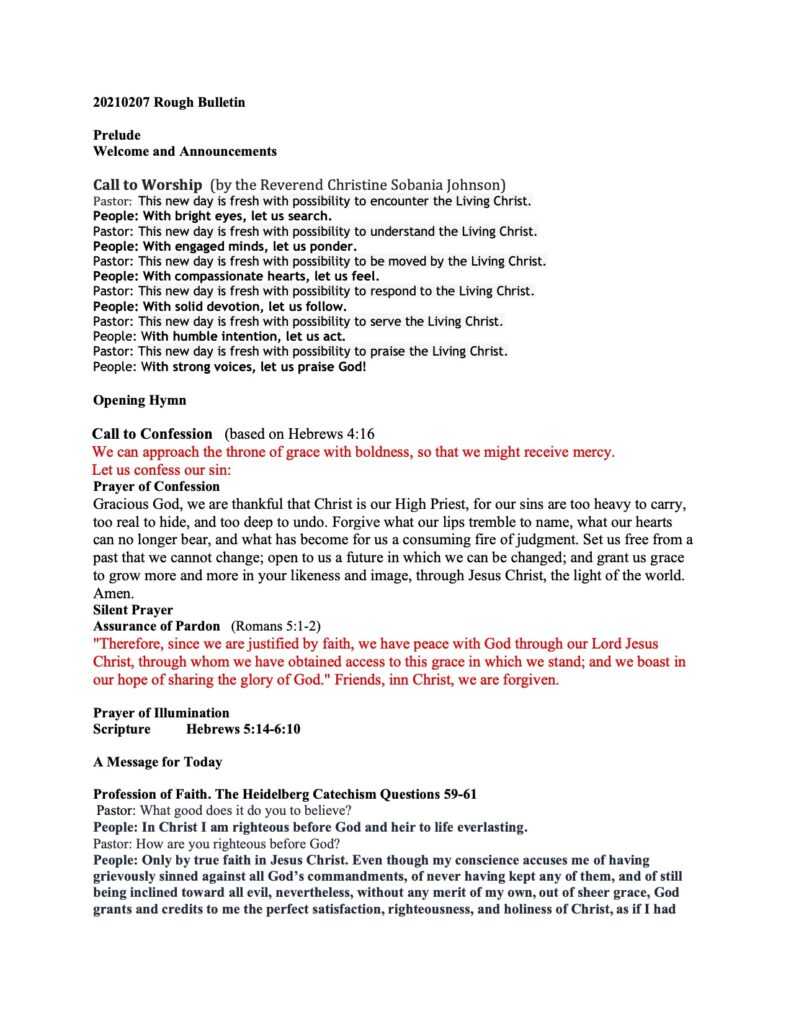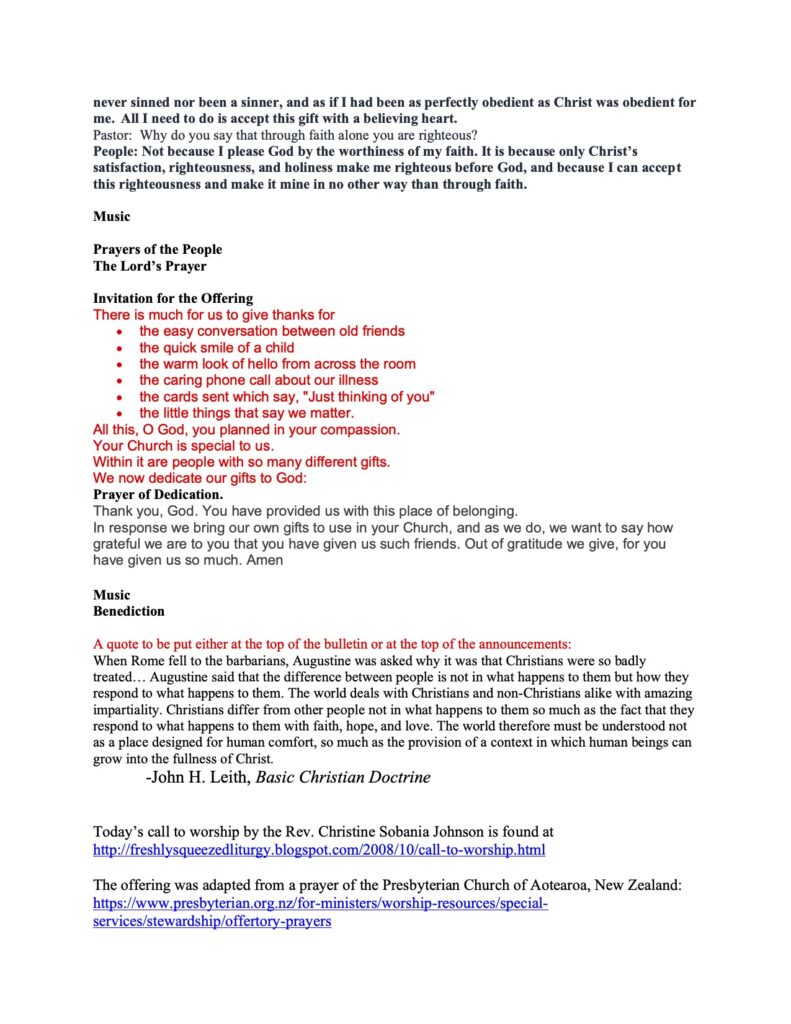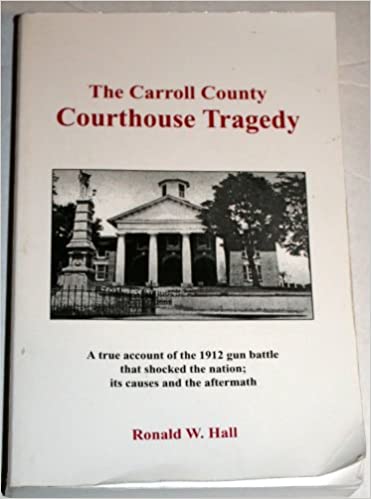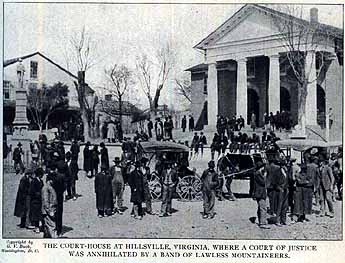Jeff Garrison
Bluemont and Mayberry Churches
February 28, 2021
Hebrews 8
c2021
At the beginning of worship
Today, as we’re continuing our work through the book of Hebrews, the author turns toward a topic he mentioned in the previous chapter: a new covenant. A covenant is a contract between two parties, in this case, between God and humanity.
The Covenant of Works
The author of Hebrews also speaks of the earlier covenant, one of works, made with Moses and the Hebrew people at Sinai. The covenant of works required obedience. But it didn’t work. The Israelites couldn’t live up to the covenant. As the Westminster Standards states, “God freely offered a second covenant, the covenant of grace.” Even while we’re in sin, God offers us life and salvation. Our requirement is that we respond with faith in Jesus Christ.[1]
The Covenant of Grace
In the covenant of grace, we witness God’s good intention for humanity. God provides a way for us to reconnect to our Creator and restore the relationship that was broken at the fall. Such an act by a gracious God fulfills John 3:16, “for God so loved the world.” Think back to the image I used two weeks ago. God has us on belay. Even if we fall off the cliff, God holds the rope.
Of course, a covenant requires the approval of both parties. God offers us a covenant, but do we accept this offer? Do we agree with the terms that we trust fully and only in Jesus Christ? Today, our scripture will be Hebrews 8.
After reading the scripture: Trying to impress others
How often do we do things to earn the approval of others? There may be a few people who are so disconnected from what other people think who don’t, at least occasionally, try to earn the approval of others. But most of us are like Charlie Brown, trying to get the attention of the Little Red-Haired Girl.
Sometimes we do silly and stupid things. The kid in school who gets in trouble as a way to be seen by a girl or get a laugh from friends. Who would do that? These kinds of attempts to earn approval are a gold mind for sitcoms and humorous movies. It rings true. We’ve all been there.
Trying to impress God
On the one hand, it would be nice if we spent such energy trying to impress God. After all, God has created us with great potential. We should want to make something out of that potential. In a way, if we do, we have something to give back to the Almighty. But that’s the wrong approach.
Let me tell you a story. When I was working for the Boy Scouts in Eastern North Carolina, we were trying to create more support for the program within the African American community. The funeral director in this town was a leader of that community and I approached him for help. Beyond the funeral home, he’d gotten Amway and saw me as a potential target for another member of his team. He swore to me that once he made a million dollars, he’d send every kid in this community to camp. I quickly realized I was not going to change his mind.
The idea that we have to “make it” to be able to give back is flawed. First of all, we will never make it which is why there are so few self-proclaimed rich people in America. We will always be pushing for more and more.
We have to learn to use what we have. When it comes to impressing God, it’s not about making and sacrificing a big fortune. Instead, as we’re told by the prophet Micah, God wants us to do justice, love kindness and to walk humbly with him.[2]
We can’t impress God
On the other hand, instead of trying to impress the Almighty, we should know we can’t impress God. To attempt to impress God is the wrong way to approach the being that knows all and sees all. Instead, our approach to God has to be with humility, gratitude, and kindness, not just toward God, but to those whom God has created.
It’s okay, we have Jesus
Furthermore, we don’t have to impress God. We have a high priest who, as Tom Long describes, “is placed on the heavenly altar, once and for all, not only for his life but—astonishingly—ours, too.” Jesus “gathers up our hunger for approval and lived a life truly pleasing to God.”[3]Jesus takes us off the hook for having to impress God.
As the Preacher of Hebrews proclaims, everything about Jesus is superior to what we can do. Not only does Jesus sit “at the right hand of the throne of Majesty in the heavens,” he ministers in a sanctuary that is greater than what we could have constructed.
Today’s text
In the opening of today’s passage, the Preacher briefly goes over what he has just concluded teaching in the previous chapter. Jesus wouldn’t have been a priest on earth as we saw last week.[4] His ministry is more excellent than that. Earthly priest, who at the time labored in the temple, were mortals and limited in what they could do. They were bound by the old covenant, the covenant of works, which means that over and over again they’d have to offer sacrifice for sin. There were flaws in the first covenant. We, the human race, couldn’t hold up our end of the bargain!
New Covenant grounded in the Old Testament
So, Jesus offers a new covenant. But this covenant isn’t one out of thin air. The Preacher quotes a passage from Jeremiah which shows this new covenant has long been a part of God’s plan.[5]
I find a lot of meaning on these words from Jeremiah. Years ago, in an article I wrote for the Presbyterian Outlook, back when our nation battled over having the 10 Commandments posted on public property, I referred to this passage. If we let God write his law upon our hearts and instill them within our minds, no one can take them away.
Don’t make an idol out of the law
Furthermore, by internalizing the law, we can be constantly reminded of what God wants from us. Otherwise, we just are reminded by this when we look at a chiseled granite monument.[6] We’re not to make an idol out of the law, as it happened at times with Israel. The law is to be living internally within us.
Also, a new relationship with God
But the greatest promise in Jeremiah’s word isn’t about the law, but a new relationship with God. Because of the work of Jesus, we can know God. It’s not a matter of teaching us what to do that is important, but us having intimate knowledge of God. Then, we can experience God’s mercy and forgiveness. Then we can live in a way that’s honorable, just, and kind. This new promised covenant provides us the freedom to live up to our full God-given potential. When we accept this covenant, we no longer need to fear the vengeance of God.
What we have with this new covenant is a shift in how God relates to the human race. And the good news is that the whole tragic history of the human race, the sin and shame, the guilt, the broken promises and the torn relationships are not the last word. In this new covenant, God promises a new day of mercy.[7] As one theologian sums up this chapter, “The age of the prophets and law is past; the age of the Son is here.[8]
What were the problem with the old covenant
Let me say a little about the old covenant. It’s easy for us to walk away and to think there was something wrong with it. The only wrong thing with the old covenant was our inability to abide by it! The cliché from a Pogo comic, “we have met the enemy and he is us,” once again rings true.
But the old covenant wasn’t bad. As Scripture points out, the new rises out of the old.[9] We shouldn’t condemn the old. In fact, God’s law (which was revealed in the old covenant) helps us in several ways. The law shows us our need for a Savior. And once we accept the salvific work of Jesus, the law shows us how we are to live in a way that’s pleasing to God.[10]
What does it mean to live in the new covenant?
So, we give thanks for both covenants as we live into the new. This covenant provides us freedom to grow in Christ. To grow in Christ means that our hearts are tenderized so that we are gentle and gracious, loving and kind. In other words, we are Christ-like. And our lives will bring him glory and praise. Amen.
[1] Presbyterian Church USA, “Westminster Confession of Faith,” Chapter 8. See Book of Confessions, 6:037-039. The Westminster Confession refers to the first covenant being with Adam, while the author of Hebrews is referring to the covenant made after the Hebrew people left Egypt and were in Sinai.
[2] Micah 6:8.
[3] Thomas Long, Hebrews (Louisville, JKP, 1997), 90.
[4] See https://fromarockyhillside.com/2021/02/hebrews-71-22-christ-as-high-priest-part-2/
[5] The quote is from Jeremiah 31:31-34. Hebrews is quoting from the Greek Old Testament (the Septuagint). See Long, 92. For a difference between the Septuagint and the Hebrew text, see Luke Timothy Johnson, Hebrews: A Commentary (Louisville, KY: WJKP, 2006), 206-207.
[6] See Jeff Garrison, “What Commandments Mean Is More Important than a Slab of Granite,” The Presbyterian Outlook, September 29, 2003.
[7] Long, 92.
[8] F. F. Bruce (Grand Rapids, MI: Eerdmans, 1964), 179.
[9] See Presbyterian Church USA, Book of Confessions, Second Helvetic Confession, XII, “The Law of God” (5.080-5.085)
[10] John Calvin speaks of three uses of the law: 1. Brings us to repentance, 2. Helps our sanctification by showing us what’s pleasing to God, and 3. The fear of it keeps the reprobate from becoming worse and being a menace to society.


















